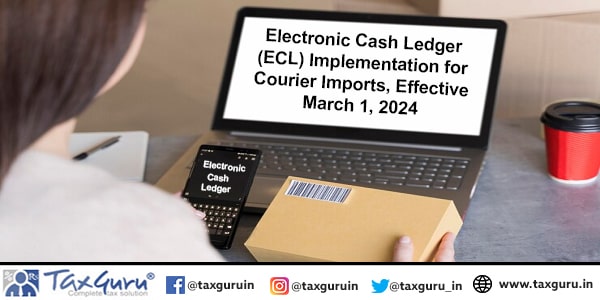The Ministry of Finance has announced the implementation of the Electronic Cash Ledger (ECL) for the payment of import duties on goods imported through Courier Mode, effective from March 1st, 2024. This move aims to streamline the payment process and enhance convenience for stakeholders in the Express Industry.
Detailed Analysis
1. ECL for Import Duties: The Electronic Cash Ledger (ECL) is designated as the mode of payment for import duties on goods imported through International Courier terminals starting March 1st, 2024. This initiative represents a significant step towards digitizing and modernizing the customs clearance process.
2. Payment Flexibility: One of the key benefits of the ECL system is the ability for Express Industry players to make payments through multiple banks via internet banking and NEFT/RTGS. This flexibility allows businesses to choose the most convenient banking option for their transactions, thereby improving efficiency and reducing operational barriers.
3. Previous Implementation: The Ministry had previously introduced the ECL system for the payment of import duties on cargo processed through Electronic Data Interchange (EDI) at various ports and terminals. The extension of this system to goods imported via Courier Mode further expands its reach and utility within the trade ecosystem.
4. Trade Facilitation Measures: To ensure a smooth transition to the new payment system, the Directorate General of Systems, Central Board of Indirect Taxes and Customs (CBIC), conducted registration melas and webinars from October to December 2023. These initiatives aimed to familiarize stakeholders with the ECL process and address any queries or concerns they may have had.
5. Successful Pilot Phase: Following extensive preparations, a pilot phase of the ECL system commenced on January 15th, 2024, and was gradually expanded to key locations such as Delhi, Bengaluru, and Mumbai. The successful execution of the pilot phase without any technical issues or disruptions underscores the readiness of the system for full-scale implementation.

Conclusion
The introduction of the Electronic Cash Ledger (ECL) for the payment of import duties on goods imported through Courier Mode marks a significant milestone in the ongoing efforts to modernize customs procedures and enhance trade facilitation. By providing greater payment flexibility and streamlining processes, the ECL system is poised to improve the ease of doing business for stakeholders in the Express Industry and contribute to the overall efficiency of India’s trade ecosystem.
*****
Ministry of Finance
Implementation of Electronic Cash Ledger (ECL) for payment of Import duties for goods imported through Courier Mode from tomorrow, i.e. 1st March 2024
With ECL, Express Industry can now make payment through multiple banks as per convenience by internet banking and NEFT/RTGS from the existing one bank
Posted On: 29 FEB 2024 8:23PM by PIB Delhi
The Electronic Cash Ledger (ECL) shall be the mode of payment of Import duties for goods imported through International Courier terminals from 01st March 2024.
With the introduction of ECL, Express Industry can make payment through multiple banks as per convenience by internet banking and NEFT/RTGS from the existing one bank.
Earlier, the Electronic Cash Ledger was implemented for payment of Import Duties for cargo processed through EDI at Seaports, Airports, ICDs and LCSs from 01st April 2023.
For implementing the new payment system by use of ECL, handholding of the trade was done by means of registration mela and webinars conducted by DG Systems, CBIC, from October to December, 2023 to familiarise different stakeholders before the launch of ECL for Express Cargo Industry.
A pilot phase was started on 15.01.2024 and the same was expanded in phases to Delhi, Bengaluru, Mumbai and all other International Courier Terminal locations. Since 12.02.2024, the pilot has been running successfully in all the locations without any glitches in the system.
The new ECL mode of payment is now available for all EXIM and it would facilitate ease of doing business to the trade.
****




